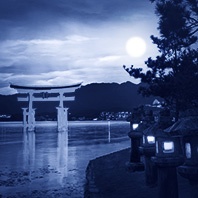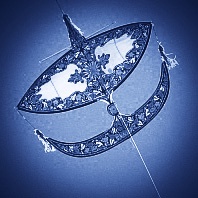Rubrik: Worth seeing
Gravity is the force of attraction of bodies. Its intensity depends on the mass: the more mass, the higher the gravity. This is the reason why the gravitational pull is greater on Earth than on the Moon, because Earth is considerably larger and heavier than the Moon. The gravitational acceleration on Earth is with approx. 9.8 m/s² six times as strong as on the Moon with approx. 1.6 m/s². This is why astronauts are able to jump higher on the Moon than on Earth and objects fall to the ground at a lower speed.
Read more
Scorpions have the quality that they are fluorescent and glow when in contact with UV radiation. This becomes clearly visible, when they are directly exposed to UV light. However, the UV components, which are contained in the sunlight and the moonlight, are hardly sufficient to produce this glow to an extent that it is visible to humans. Still, scorpions appear to detect the UV components and hence react to moonlight.
Read more
The German painter Lovis Corinth (1858–1925) is considered one of the most important representatives of German Impressionism, in his late work also Expressionism. In 1919, his wife built a house for him at the Lake Walchen, south of Munich in the Bavarian Alps. The following years, he spent a lot of time there and derived his inspiration from the landscape and lighting atmosphere for numerous paintings, which often show Lake Walchen.
Read more
The jazz classic »Fly Me To The Moon«, originally written by Bart Howard in 1954, gained worldwide fame through Frank Sinatra (1915–1998). His version from 1964 accompanied the space mission Apollo 10 to the Moon in May of 1969, and was played when the spaceship orbited the Moon. Further, it was the first song ever that was played on the Moon, when Buzz Aldrin stepped onto the Moon with a portable cassette player during the Apollo 11 mission in July 1969.
Read more
»The Woman of the Apocalypse« is a depiction of a Virgin Mary that is surrounded by sunrays (hence she is also called sun-crowned Madonna), and shows a moon crescent underneath her feet. Quite often stars can also be seen around her head. This portrait goes back to the biblical text »The Woman and the Dragon« in the Revelation of John, chapter 12. This describes the fight of heaven against the red dragon that embodies the evil in the world.
Read more
Japan has a custom, which is called “Tsukimi” or also “Otsukimi” that literally means “moon-viewing” (tsuki = jap. Moon). This tradition dates back to the Heian period (794–1192) where Japanese culture and the arts were refined to a high degree. At that time, elements of the Chinese “Mid-Autumn Moon Festival” were introduced in Japan, and festivals and rituals were held in the eighth sun month (which corresponds to September in our current calendar).
Read more
The film is based on the book of the same title by Cressida Cowell (2003), was released in 2010 in movie theaters and became one of the most successful animations and earned nearly $500 million. Next to its impressive technical quality of the animation, it is most of all about the story of Hickup, a son of a Viking, who flies directly into the hearts of the audience, with his ability to tame dragons, which was a hostile skill to have up until then.
Read more
The Belgium painter René Magritte (1898–1967) was next to Salvador Dalí, one of the most influential painters of surrealism. This denotes a style in art (and in other areas), which has tried to use dreamlike, fantastical and absurd elements as techniques of expression for a new superior reality, since the 1920s.
Read more
The antlion is the larva of the myrmeleon, which belongs to the net-winged insects. This insect grows to be 0.6 inches and predominantly stands out because of its large jaw pincers, which let you anticipate its predatory disposition. The antlion is famous for its sophisticated method catching prey. It digs funnels in the sand that function like a trap for other insects (i.e., ants or spiders). When prey steps on the edge of the funnel, the antlion begins to throw sand on the animal from the bottom of the funnel. The thereby created movements, activate the slipping of the funnel walls and transport the prey directly into the fangs of the antlion, who then kills them with its poison.
Read more
As already mentioned before, the Moon assumes a special status in Asia as well. There are a few important festivals, which are closely connected to the Moon, like for example the Moon Festival and the Lantern Festival in China, or many celebrations in Buddhism and Hinduism.
In Malaysia, in South East Asia, there is a traditional kite called »wau bulan«, whereas »wau« stands for kite and »bulan« for the Moon. The kite got its name because of its moon crescent-shaped lower part. When you fly this kite, it supposed to remind of the rising Moon.
Read more










